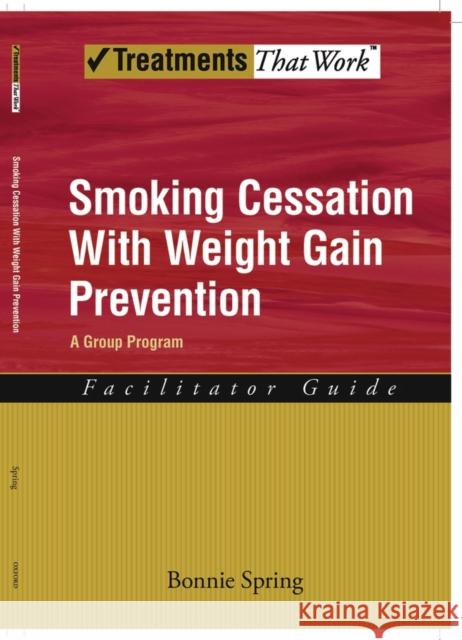Smoking Cessation with Weight Gain Prevention: A Group Program » książka
topmenu
Smoking Cessation with Weight Gain Prevention: A Group Program
ISBN-13: 9780195314021 / Angielski / Miękka / 2008 / 144 str.
Smoking Cessation with Weight Gain Prevention: A Group Program
ISBN-13: 9780195314021 / Angielski / Miękka / 2008 / 144 str.
cena 255,83
(netto: 243,65 VAT: 5%)
Najniższa cena z 30 dni: 225,77
(netto: 243,65 VAT: 5%)
Najniższa cena z 30 dni: 225,77
Termin realizacji zamówienia:
ok. 16-18 dni roboczych.
ok. 16-18 dni roboczych.
Darmowa dostawa!
Cigarette smoking is the single greatest preventable cause of death, disease, and disability in the United States. It is the number one cancer killer of women, surpassing breast cancer. More than 70% of smokers have expressed a desire to quit, but are unable to do so alone. Independent cessation is extremely difficult, with a long-term success rate of 3-9%.Couple this difficulty with the fact that many female (and some male) smokers do not even try to quit because they are afraid of the resulting weight gain, and it seems a near impossibility for smokers to quit alone.
Any amount of counseling, from even one ten-minute session, drastically improves a person's chances for cessation success. Many therapists have clients who smoke, yet they do not encourage them to quit because they feel under-equipped to help them. There are very few books for mental health workers that teach smoking cessation techniques; almost all of the books on the market are self-help based. Of those that are for the clinician, most are not user-friendly at all, and none discuss the secondary concerns of weight gain. This guide teaches therapists, in easy to follow session modules, proven methods for their clients to stop smoking, and to avoid the resulting weight gain. Structured as a 16-week group program, this treatment teaches clients to break their smoking habit first, then to avoid replacing that habit with unhealthy eating. Using cognitive-behavioral therapy (CBT), this treatment emphasizes skill-building and the use of self-monitoring forms (found in the accompanying workbook) to help clients take control of their health. TreatmentsThatWorkTM represents the gold standard of behavioral healthcare interventions - All programs have been rigorously tested in clinical trials and are backed by years of research - A prestigious scientific advisory board, led by series Editor-In-Chief David H. Barlow, reviews and evaluates each intervention to ensure that it meets the highest standard of evidence so you can be confident that you are using the most effective treatment available to date - Our books are reliable and effective and make it easy for you to provide your clients with the best care available - Our corresponding workbooks contain psychoeducational information, forms and worksheets, and homework assignments to keep clients engaged and motivated - A companion website (www.oup.com/us/ttw) offers downloadable clinical tools and helpful resources - Continuing Education (CE) Credits are now available on select titles in collaboration with PsychoEducational Resources, Inc. (PER)










